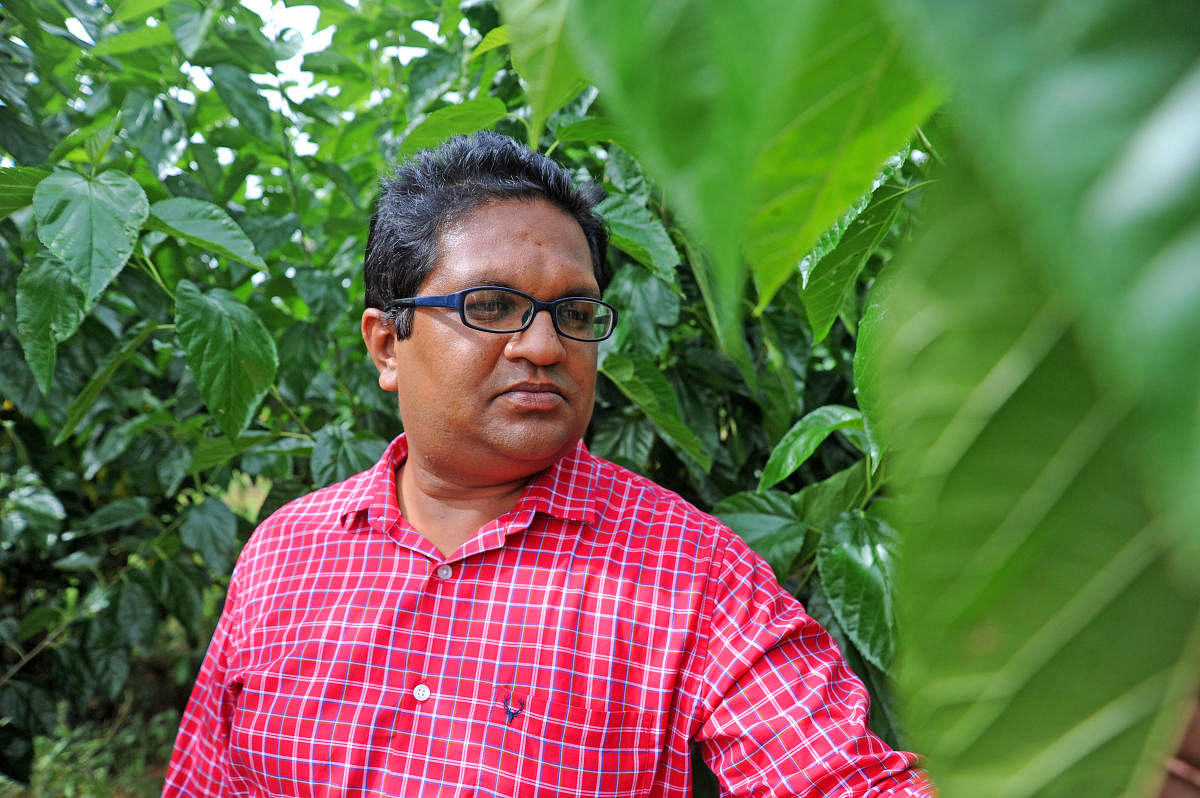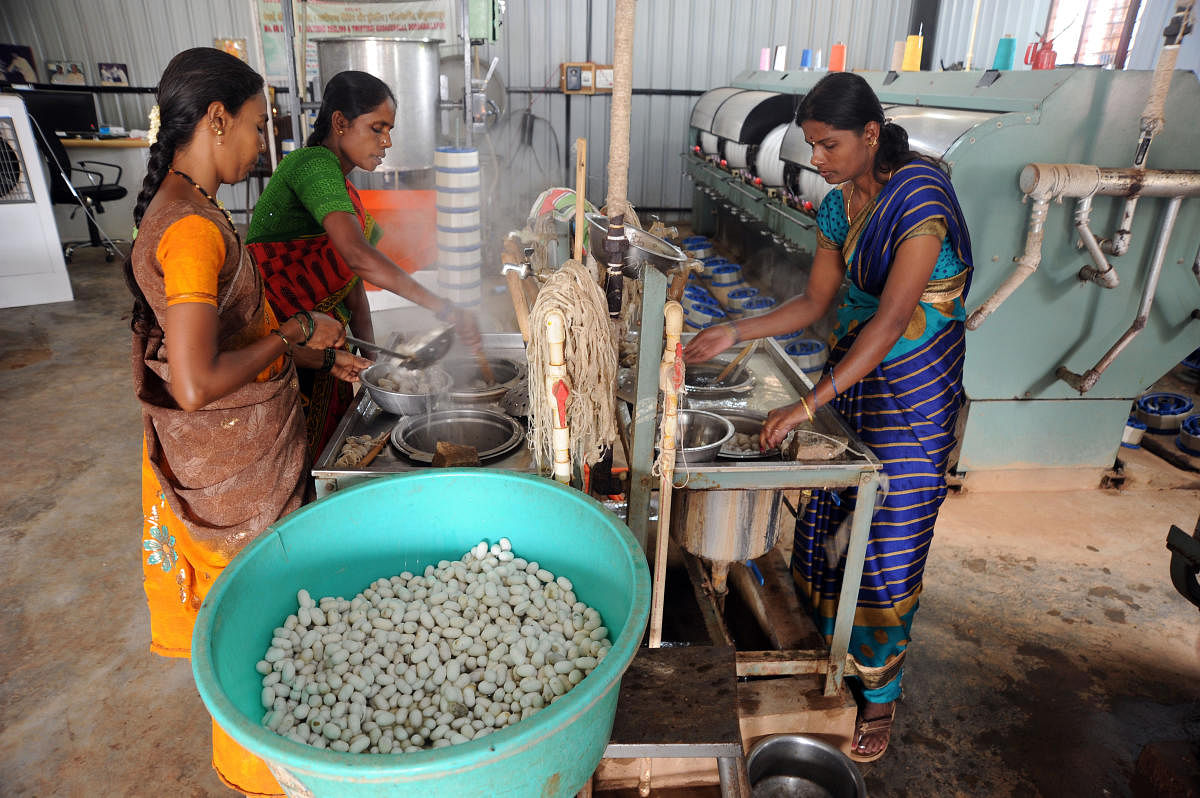Silk yarn that travels far and wide


A diploma in Computer Technologies had fetched Manoj a fancy IT job and he soon shifted base from his hometown to Bengaluru. His wife too was earning. Owing to growing expenses, the husband and wife duo who stayed in a rented house in the City was grappling for savings.
Seven years passed by and they felt that not much had changed in their way of living. “I neither had the job satisfaction nor did I have sufficient money,” recollects Manoj.
When he realised that he had to rely on his father to meet their needs, it was a wake up call. “It triggered me to start doing something different,” he said.
Today, Manoj’s idea has turned into a success story and the Central Silk Board proudly cites his story to anyone who wishes to start sericulture. Just two years into the business, this first generation entrepreneur is the first in the country to export silk yarn, spun to the specifications of international companies.
So what makes it unique? If one was to think of silk, it would be synonymous with Ramanagara. Manoj, however, decided to work from Doddaballapura, where nobody knew how to make silk yarns though most are accomplished weavers.
Doddaballapura, Bengaluru’s immediate neighbour, is now being eyed by real-estate giants. Withstanding the real estate boom is an industry that breathes lives into silk sarees. The sounds of a weaving loom are what every household in Doddaballapura has been familiar with for decades. The rhythmic beats from the loom echoes in every corner of every street here, as small sheds house enterprises of weavers and artisans.
Known for the manufacture of woven sarees, Doddaballapura is dubbed to be the state’s Manchester. However, handling cocoons and making silk yarns is a new introduction here.
In a rather unassuming corner, away from the weaving blocks, Manoj began his start-up. His enterprise kindled curiosity among the locals.
His factory sits on a 30X50 sq ft land. Unperturbed by the sound of machines are barn swallows and tailor birds that pick on the remains of the cocoons discarded outside.
Over the last two years, this is where the entrepreneur has been working from.
Source of inspiration
“When my father was on a tour to North Karnataka, he saw the working of reels and thought that we could give this a try. It was an entirely different ball game as none in the family were involved in making silk,” says Manoj. His father, Mohan Kumar, a sexagenarian was his primary inspiration.
The duo approached the Central Silk Board, procured equipments and got a 75% rebate. The Central Silk Board also promised to offer all the technical assistance they needed.
“I saw a similar set up in Dharwad. I was told that there would be several challenges. When cocoons are processed, it releases a bad odour. We were warned that the neighbours could complain,” said Mohan. “Yet, I wanted to start it.”
By the time, Manoj realised that he kept aside no money for the procurement of cocoons, it was a little too late. “I sold my car to buy cocoons,” he explained.
In the beginning, 50 enthusiastic local women attended the training sessions on site. With discussions about pay, they just turned their backs.
“I wanted to give employment opportunities to rural women. We could then afford to pay only Rs 150 per day. Most women did not show up for work the following day. I felt I was left in the lurch. Just when I thought I had to face quite a big challenge, four women came back for negotiation and agreed to work if I paid them Rs 20 extra for transport. We consented,” said Manoj.
“We were initially short of staff and my wife even when she was expecting our child, had to work with the other women. But, I did not want to give up,” he said.
Today, this entrepreneur has employed over 20 women from the villages of Doddaballapura in his start-up. Chandraprabha, a resident of Mandibyaradahalli, was among the four women who came back. “Earlier, I was not earning. I heard about this venture from a neighbour. After the training, I realised that even Manoj had invested quite a lot. A humanitarian thought prompted me to come back the next day,” said Chandraprabha.
Today, women here earn a wage of Rs 300 per day and it has made a significant difference in their lives. “Initially, I was averse to the smell. Now, I am used to it. With the earnings, I am able to pay a part of my house rent,” said Kemparathnamma, another employee.
Manoj got a big break, quite unexpectedly, when he posted one of his videos online and a man from Morocco happened to contact him. “He asked us to send an order of 100 kilos for a yarn of a different denier that is not usually manufactured in India. He was willing to pay the whole sum in advance. For both of us, it was a risky affair. I only agreed for 30 kilos to begin with. I received the money before commencing work. Even the courier charges were taken care of,” he said. “Today, when he sends me pictures of clothes made from the yarn we sent, it gives me a sense of pride.”
Officials in the Central Silk Board explain that this is the first of its kind in the country.
“Many had earlier unsuccessfully tried their hand in reeling at Doddaballapura. The water in Doddaballapura is hard water, which is not suited for making silk yarns. Manoj has installed a water-softener and hence is able to make yarns. We assisted him with a trainer for over six months. The semi-automatic machine that was priced at Rs 15 lakh was provided to him at Rs 4.5 Lakhs. In a span of two years, his efforts have been commendable,” said Itagi M R, scientist at Central Silk Board.
Benefits to locals
Those who rear silk worms in Doddaballapura had to earlier travel to Ramanagara market where sericulturists from across the state bring cocoons and auction their produce. This initiative has made the selling process easier for the locals.
“I buy cocoons from Doddaballapura itself. If they auction it in Ramanagara, it is like a gamble. Some get a good price while others don’t. I give them an even rate. They also save on transportation cost,” he said.
Deccan Herald is on WhatsApp Channels| Join now for Breaking News & Editor's Picks